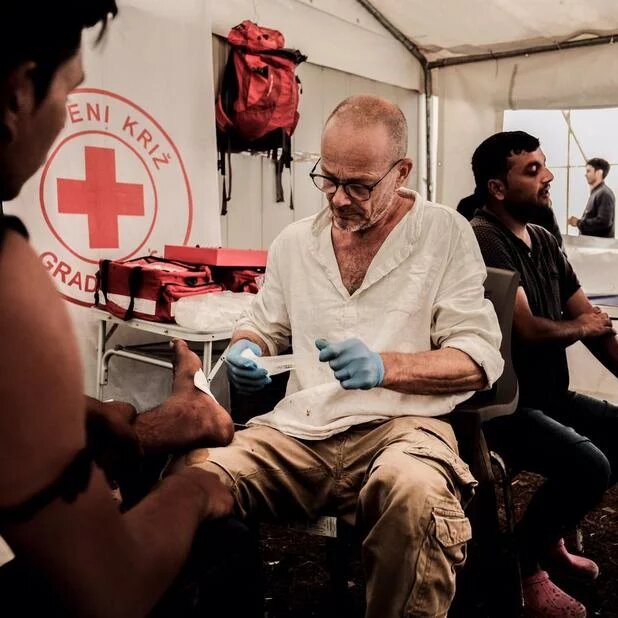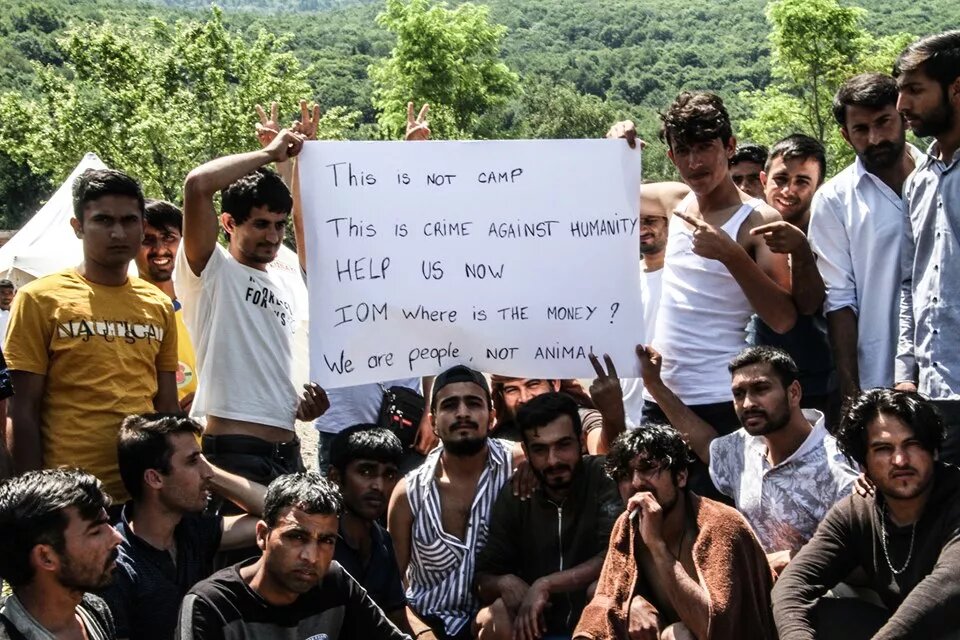
A devastating decline of Human-Rights is happening in Bosnia and Herzegovina and more particularly in the Una-Sana Canton. In just a few weeks, almost all the fundamental rights guaranteed by international law were continuously violated: deprivation of access to water, food and shelters and violation of the right to medical care and freedom of movement

Winter is coming and with it a humanitarian crisis at the edge of Europe.
A devastating decline of Human-Rights is happening in Bosnia and Herzegovina and more particularly in the Una-Sana Canton. In just a few weeks, almost all the fundamental rights guaranteed by international law were continuously violated: deprivation of access to water, food and shelters and violation of the right to medical care and freedom of movement.
Since January 2018, Bosnia and Herzegovina has recorded more than 45’000 entries on its territory, far from the 700 registrations for the year 2015. This increase is partly due to the closure of the Croatian and Hungarian borders. As a result, northern Bosnia, and in particularly the Una Sana Canton, become a bottle neck for thousands of refugees. Bihać, Velika Kladuša and Cazin as others city became a hotspot for people desiring to join the European Union and the once who experimented a push back by the Croatia authorities.
To handle the situation in Bihać three camps have been created: Borici for families and vulnerable persons, Miral reserved for mens and unaccompanied minors and the Hotel Sendra for families. The people within the camps complain of the lack of showers and toilets, violence from private security forces and a lack of free movement. Moreover, at the beginning of 2019, newcomers don’t have any more access to these camps due to the capacity. Therefore, they are forced to seek refuge in abandoned houses, squats and on the street in and around Bihać. The situation encountered resistance within the population of Bihać.
As a replay to the ongoing resistance within the population, Suhret Fazlic, the mayor of Bihać, decided on the 14 of June 2019 to open a new camp. More than 700 people in transit were deported in this new camp called Vučjak. During few months this camp became an example of the lack of dignity and humanity for people attempting to claim asylum in Europe.
On Monday the 14 October 2019, the mayor of Bihać, decided to stop any financial support for the supply of water and food in the Vučjak camp. After this decision and in despite the fact that international authorities described the Vučjak camp as inhuman, the police arrested more than 1700 refugees in transit to take them by force to the camp which now reaches around 2500 residents.
I decided to travel to Bihać to meet Dirk Planert and get an image of the situation there. Dirk Planert is journalist and was providing medical aid during four months in the Vučjak. It was still dark when I entered into the bus to cross Bosnia and Herzegovina to reach Bihać. "Refugees sit behind! ", that's what the bus driver tells me, incorrectly thinking I'm a refugee. Barring myself from the path leading to the front of the bus, I decided at that moment to assume this identity in order to better understand the way in which the refugees are perceived. I sit at the back of the bus. At the first stop, a refugee gets off the bus, while some passengers in the front of the bus start to laugh. The driver gets up with a deodorant spray and theatrically clean the now empty seat, accent the enjoyment of some passenger.
A few hours later the bus stops on the side of a highway. A checkpoint is present at the entrance of the Una Sana Canton where buses are required to stop in order to check the passengers entering in the territory. When the bus doors open, a woman sitting at the front of the bus rises her hand to attract the police's attention. She points her finger at me. A gesture of denunciation. This situation, this scene, makes me think of dark periods in our history. Not surprisingly the policeman enters into the bus to ask me for my papers.
A Bosnian journalist told me later that she has witnessed many evictions of refuges from public transport. Some of them are more remarkable than others. She explains me in detail about the eviction of an elderly and a younger couple with their child. All five of them had boarded in Sarajevo and wanted to go to the North of Bosnia to seek asylum in Croatia. Few hours before their arrival in Bihać at the entrance of the Una Sana Canton, police officers entered in the bus and threw them off the bus, in the middle of the night and under heavy snowfall. “It was terrible, they were miles away from the first village.” And today this has become a norm. Indeed, the mayor of the Canton has set up a system of checks points to prevent refugees and asylum seekers from reaching the North of Bosnia.
At 12:00 I finally arrive in Bihać. I decide to go to the city center to have a coffee and waiting for Dirk Planert. While I was walking in the street, I had the feeling to encounter looks and suspicious behaviors towards me. It's unfamiliar, but I don't perceive it as an attack against me. On my way I enter in the first coffee, as usually I sit at a table, but I am asked to get up and leave the place. A little bit surprised by this reaction I try to enter in another coffee where the manager's pushes me out. Arrived at a third place I try to start to talk to the owner of the coffee while he looks at me and tell me "You are not allowed to stay, we don't want you here, leave now!”.
So, I decide to go back to the bus station to wait there for Dirk Planert. Around me, children, women, men marked by fatigue, most seem to have returned from the game ( game = the colloquial term used by people in transit to describe the process of attempting to cross the border) recognizable by the stigmas that the Croatian police have left on them: hematomas and bandages, broken mobile phones by batons in the image of their fate.
From the Honorary Citizen ...
Later Dirk picks me up at the bus station. Few months ago, Dirk Planert was invited to present his Photography’s taken throughout his humanitarian mission during the Bosnian war. His engagement earned him the distinction of honorary citizen of Bihać.
In the middle of the preparation of his exhibition Dirk Planert receives a call from a friend. With a worried voice he asks him to come immediately to the city center. Something was happening. It is June 14, 2019 and buses are dispatched to the city where police officers are forcing refugees to get in the buses. Dirk explain me the situation: “I started to follow the buses. Suddenly they stopped near a makeshift camp. When I get out of my car a man who got off the bus literally falls at my feet, mistreated by a police officer while he was in the middle of an appendicitis crisis."
This scene that seems to come straight out of a bad movie is unfortunately real. At this point Dirk was asking himself: should I continue my photography work and ignore what was happening, or should I stay and act by providing support to the refugees. A few days later the medical tent was set up in the middle of the garbage field, the so called Vučjak camp.
"You really have to see it to believe it!" he continues. The camp is built on a wasteland and near a minefield. Showers and toilets are out of order and diseases due to the insalubrity of the camp are beginning to spread. Vučjak 's conditions are so deplorable that the IOM has refused to bring teams to the camp. It is in this context that Dirk and his team have taken care of the refugees for more than four months. "We have treated around 200 people a day since June." Dirk describes bodies devastated by travel, scabies epidemics, disastrous sanitary conditions. "Our help is simply fundamental in this camp, it’s a question about life and death."
... to the Criminal .
However, on the 27 September 2019, the police entered in the medical team's tent and confiscated the passports of each of the volunteers. Then they were called for questioning. After paying around hundred and forty euros to get back the documents, the team was forced to leave the territory within seven days, leaving the Vučjak camp behind them without any medical assistance. This criminalisation of solidarity, since the beginning of the year touch 28 others volunteers all along the country.
Arrived at the end of the conversation Dirk explain me that since he was banned from entering the camp he had received many threatening messages. "I will have to go back to Germany because my safety is no longer assured here, but I will make sure to denounce this situation in order to alert the public and Brussel of what is going on. But the time of politics is long, and winter is at our doorstep."
It is 3pm when I take the bus back to Sarajevo. I am sitting in the back of the bus when I got the latest news : Since 15th November 2019 has been concluded the establishment of a full curfew for refugees in the Miral (in Velika Kladuša) and Bira camps. Only those heading toward the Croatian border will be allowed to leave camps while the Croatian police have been accused of violent pushback of migrants.
The freedom of movement for refugees is officially ban from the Una Sana Canton and with the drop of temperatures and the current state of affairs, it is a humanitarian disaster that is being conscientiously prepared at the gates of the European Union.
